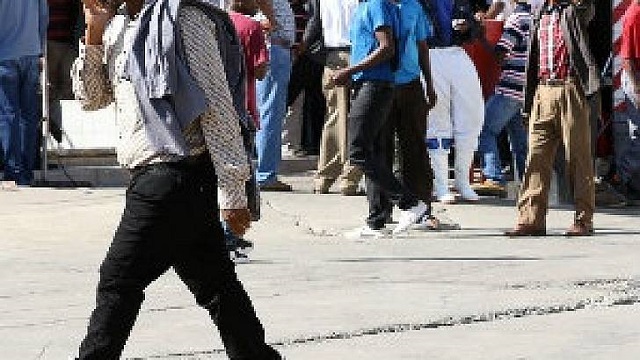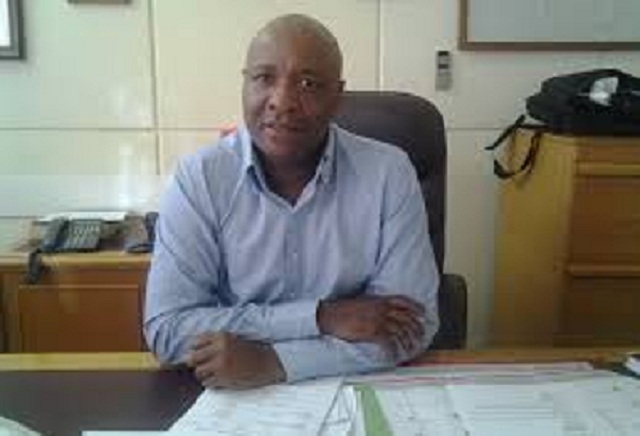EDITORIAL COMMENT: MDC-T must desist from violence


MDC-T pro-Khupe supporters retaliate to anti-Khupe supporters at their offices in Bulawayo on Sunday afternoon
MDC-T is inching towards yet another split after members from rival factions were involved in a bloody clash in Bulawayo on Sunday.
The party has been divided in recent weeks over the succession of founding leader, Mr Morgan Tsvangirai who died on February 14. Dr Thokozani Khupe who was his deputy after her election to that position in 2014, asserts that in terms of the party constitution, she must lead until an extra-ordinary congress is held to elect a new leader.
On the other hand, co-deputy president, Mr Nelson Chamisa, who wasn’t elected but was handpicked by Tsvangirai in July 2016, has declared himself the new acting president. He recently orchestrated the holding of a national council meeting that named him to that position. But before then, he had staged an effective coup, using a letter whose authorship is widely contested but which he claims was written by Tsvangirai declaring him (Mr Chamisa) as in charge of the party as he (Tsvangirai) lay on his deathbed in South Africa.
Before the latest confrontation in Bulawayo, Dr Khupe and organising secretary Mr Abednico Bhebhe had survived what they say was an assassination attempt at Tsvangirai’s burial in Buhera on February 20. MDC-T militants loyal to Mr Chamisa, the so-called Vanguard, tried to set alight a hut in which Dr Khupe and Mr Bhebhe had hidden.
They were at it again on Sunday.
The fearsome, often-high youths descended on the MDC-T provincial offices in the city having got information that Dr Khupe, Mr Bhebhe and party spokesperson, Mr Obert Gutu, were holding a consultative meeting with party structures from Matabeleland region. They were armed with stones, sticks and other crude weapons. They threw stones at the offices, breaking windowpanes, damaging vehicles and other property. Dozens were injured in the fracas including Dr Khupe’s assistant, Mr Witness Dube. Calm was only restored after the anti-riot police had stepped in.
Confirming that the party had all but broken up, Dr Khupe told Chronicle on Sunday:
“I’m short of words. I’ve never seen such violent acts. This is what we have always been talking about that the MDC was formed on the foundation of a constitution and on the foundation of non-violence. We have never seen such kind of violence involving party supporters before.
“How do you attack people who are just gathered to organise themselves. If you are popular why are you not going to campaign to the people and get those votes? Why do you have to beat up people, why do you have to injure people? Why do you have to vandalise offices and cars?
“Remember we were assaulted in Buhera, these are the same people who are behind this violence. We were assaulted in this same office last year in August now they have followed us again.”
Anything is possible in politics, but we don’t see a way back for MDC-T at this stage. The recent developments, particularly Mr Chamisa’s apparent willingness to use violence as a political tool, surely points to yet another split of the opposition party. Prior to the Buhera and Bulawayo skirmishes there was already bad blood between them — each of them convinced that they must be the leader, the former citing the constitution and the latter citing the “popular” will of MDC-T’s membership.
We don’t think Dr Khupe would be willing to subordinate herself to someone she dismisses as an unelected green horn who served, not as a deputy president like her, but as a mere assistant to Tsvangirai. At the same time, we don’t think Mr Chamisa, having gone this far, would be willing to submit to the party constitution which, in our view, supports Dr Khupe’s assertion that she is the legitimate leader of the party.
We don’t think Mr Chamisa has enough courage and confidence to subject himself to an internal election to come up with Tsvangirai’s successor. He has a bad record in internal elections, having lost in the secretary general’s race at the 2016 congress to Mr Douglas Mwonzora.
What we are witnessing is further evidence of a party whose history is littered with violence and violent break-ups. All the splits that have occurred in the party were accelerated by violence. In 2005 the party leaders warred over whether to participate in the senatorial elections or not. Tsvangirai argued that they mustn’t while his deputy at the time, Gibson Sibanda insisted they do. That gave rise to the pro-senate and anti-senate factions led by Sibanda and Tsvangirai respectively. The latter set his loyalists to attack the former and his allies including Linos Mushonga, Simangele Manyere, Tawanda Udzerema and Lackson Mudachira. That is the point at which MDC split into MDC one of whose leaders was Sibanda and MDC-T that Tsvangirai led.
In 2014, Tsvangirai is alleged to have set his supporters to attack Messers Tendai Biti and Elton Mangoma after they had differed. This resulted in yet another schism with MDC-Renewal being established. The party seems to be headed for a similar episode — Mr Chamisa heading the larger faction of it with Dr Khupe heading the smaller one but one that is likely to hold sway in MDC-T’s Matabeleland stronghold.
We must highlight also that what we are witnessing underlines the point that MDC-T is inherently a violent political party whose leaders and rank and file see nothing immoral about resorting to violence to get their way. If they can savagely attack each other as they did on Sunday, what can stop them from doing worse on Zanu-PF members and supporters, for instance?
We haven’t seen anything like this in Zanu-PF even at the height of the G40 infamy. We cannot be too wrong if we argue that, on the evidence of Sunday and other incidents before it; MDC in its many variants is responsible for the inter-party violence that has marred our elections over the past 18 years but is good at blaming the ruling party for it.
We condemn the violence and pray that they will not intensify it internally and scale it up to national elections that President Emmerson Mnangagwa has said must be violence-free and fair.








Comments